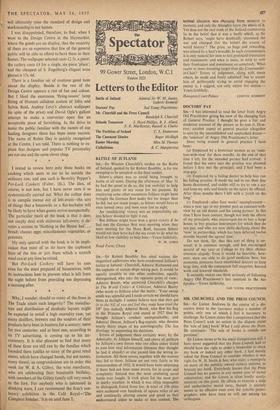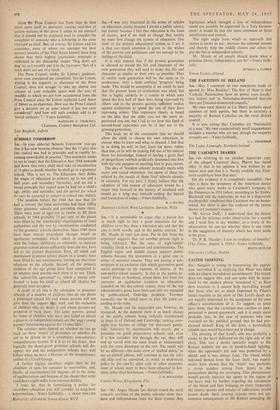MR. CHURCHILL AND THE PRESS COUNCIL
SIR,—Sir Linton Andrews in the course of a dis- cursive letter to the Spectator makes a number of points, only one of which I feel it necessary to challenge. Sir Linton states that I complained that the Press Council took no action in the dispute about the 'sale of [my] book' What I said about the Press. He continues : 'The sale of hooks is outside our province.' Sir Linton seems to be his usual disingenuous self. I have never suggested that the Press Council had or should have the right to order a bookseller to stock my book or indeed any other book. I had merely asked the Press Council to consider whether it was right for W. H. Smith & Son, who enjoy a monopoly on many of the publicly owned railway stations, to boycott my book. Everybody knows that the Press Council has no powers in any matter save of moral exhortation; and Sir Linton is often loudly sancti- ' monious on this point. He affects to exercise a wide and authoritative moral sway, though it scarcely seems to be effective even over the notable porno- graphers who have been or still are among his ' colleagues. Since the Press Council has from time to time taken upon itself to denounce various activities of certain sections of the press it seems to me comical that it should not be prepared even to consider the complaint of someone who is labouring in the same vineyard as itself. But, of course, Sir Linton and his associates, some of whom are amongst the least savoury inmates of the Fleet Street kennel, have long shown that their highest journalistic principle is enshrined in the distasteful slogan 'Dog don't eat dog' or, as I recently put it in the Spectator, 'Son of a bitch don't eat son of a bitch.'
The Press Council, under,. Sir Linton's guidance, never even considered my complaint. Yet Sir Linton, Writing in his capacity as chairman of the Press Council, does not scruple to take up almost one column of your valuable space with the sort of twaddle to which we are now accustomed from the Press Council since Sir Linton replaced Lord Astor of Hever as its chairman. How can the Press Council give a decision on an issue which it has not even considered? And how will such conduct add to its `moral authority"?—Yours faithfully, Iasi Bergh.lt, Suffolk































 Previous page
Previous page